Launch and Ideas
The YBM/AVY was launched officially at a Breton Party Congress in Blain, in March 2007. At the beginning, it was formed of a few members of the party willing to make actions and proposals specific to the youth. At their launch, the Young Bretons published the "Young Bretons Manifesto", in which they denounce what they think are France's failures on the political, economical and cultural fields. They criticized the French attitude towards Europe and the failure of decentralization and public reforms in general, and called out to "emancipation" and reunification of Brittany, within a federal Europe.
As the Breton Party, the YBM/AVY advocates a new approach to Breton issues, by emphasizing the European dimension of their ideas : they reject the idea of identity withdrawal and claim they want to simply exist as the other countries. The lead idea of the Manifesto is the point that in a European framework, which is the movement's reference, Brittany is a country like any other, and therefore must have the same political rights as Estonia, Slovenia or Ireland.
In March 2008, for the city council elections, the Young Bretons publish a document called "It’s now we must change things", which summarizes their proposals on topics specific to youth such as housing or universities. They propose, among other items, to struggle against the building of secondary homes on the seaside, or to create a Breton university system which regroups universities and colleges, all this within the framework of Brittany as a member of the European Union.
Main subjects
Beyond the institutional issues, the YBM/AVY mainly addresses the European, university and environment issues. Thus, they have several times advocated a federal Europe and criticized French policies towards Europe, that are in their opinion not enough in favour of European integration. The movement often takes a stand on university reforms : thus, it denounced the 2007 University Freedom and Responsibility Act which, in their opinion, is a mere transfer of expenses without a real autonomy. Likewise, the YBM/AVY opposes introducing student fees and takes as an example the Welsh universities. It also calls out to the regional council to make up for the state's reduction of expenses as far as help for disabled persons is concerned. The Young Bretons also organized campaigns to raise the public awareness on issues linked with the seaside, in particular housing. They denounced the bulge of secondary homes and proposed a stronger seaside act, as well as a limitation (by tax) of the numbers of buildings, as well as the creation of protected markets.
Relations with other organizations
Since the beginning, the YBM/AVY has had relations with other nationalist movements in Europe, whether from the centre-left or the centre-right. In December 2006, they participated in Bilbao in the international youth days for self-determination, organized by Euzko Gaztedi (EGI). They have links with YEN (Youth of European Nationalities – gathering youth associations from national or cultural minorities in Europe), and participated in several of their seminars. In August 2008, the movement organized their first summer days, together with Flemish and Basque representatives, from Nieuw-Vlaamse Alliantie and EGI. On the occasion of these days is written the "Lorient Declaration on self-determination" where they denounce the attitude of some European governments, which, according to the text, slow down the decision process of the citizens on their institutions.
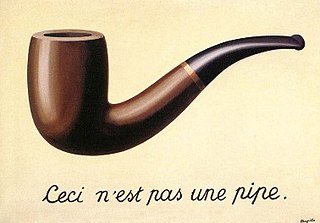
Surrealism is a cultural movement that developed in Europe in the aftermath of World War I in which artists depicted unnerving, illogical scenes and developed techniques to allow the unconscious mind to express itself. Its aim was, according to leader André Breton, to "resolve the previously contradictory conditions of dream and reality into an absolute reality, a super-reality", or surreality. It produced works of painting, writing, theatre, filmmaking, photography, and other media.

Brittany is a peninsula, historical country and cultural area in the north-west of modern France, covering the western part of what was known as Armorica during the period of Roman occupation. It became an independent kingdom and then a duchy before being united with the Kingdom of France in 1532 as a province governed as a separate nation under the crown.
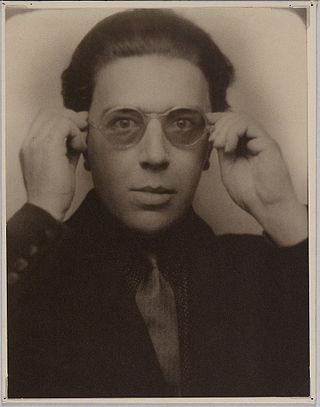
André Robert Breton was a French writer and poet, the co-founder, leader, and principal theorist of surrealism. His writings include the first Surrealist Manifesto of 1924, in which he defined surrealism as "pure psychic automatism".
Since the early 1970s, Brittany has experienced a tremendous revival of its folk music. Along with flourishing traditional forms such as the bombard-biniou pair and fest-noz ensembles incorporating other additional instruments, it has also branched out into numerous subgenres.

The history of Brittany may refer to the entire history of the Armorican peninsula or only to the creation and development of a specifically Brythonic culture and state in the Early Middle Ages and the subsequent history of that state.

The Breton Revolutionary Army is an illegal armed organization that is part of the Breton nationalism movement in the Brittany region of France.
Emgann is a left-wing Breton nationalist movement in Brittany, France. Founded in 1982, it soon became one of the principal groups agitating for Breton independence. They describe themselves as a "Left-wing independentist movement" which "fights for the emancipation and the national liberation of the Breton people and their direct representation in European authorities".
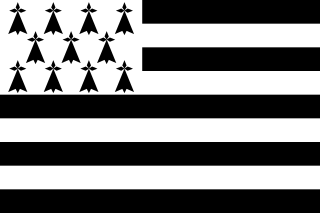
Breton nationalism is a form of regional nationalism associated with the region of Brittany in France. The political aspirations of Breton nationalists include the desire to obtain the right to self-rule, whether within France or independently of it, and to acquire more representation within the European Union, United Nations, and other international institutions.

Seiz Breur was an artistic movement founded in 1923 in Brittany. Although it adopted the symbolic name seiz breur, meaning seven brothers in the Breton language, this did not refer to the number of members, but to the title of a folk-story. At its height it had fifty members united as the "Unvaniezh Seiz Breur".
Régions et Peuples Solidaires is a political federation of various regionalist parties in France. It was founded in 1995, in order to organise a coordinated fight against "Parisian centrism" and "Jacobin conception of peoples" on the French state level. Its president is Gustave Alirol, the chairman of Partit Occitan.

Olier Mordrel is the Breton language version of Olivier Mordrelle, a Breton nationalist and wartime collaborator with the Third Reich who founded the separatist Breton National Party. Before the war, he worked as an architect. His architectural work was influenced by Art Deco and the International style of Le Corbusier. He was also an essayist, short story writer, and translator. Mordrel wrote some of his works under the pen names Jean de La Bénelais, J. La B, Er Gédour, A. Calvez, Otto Mohr, Brython, and Olivier Launay.

Yann-Ber Kallocʼh was a Breton war poet who wrote in both Breton and French.
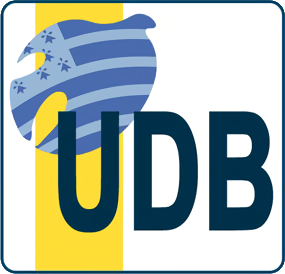
Breton Democratic Union is a Breton nationalist, autonomist, and regionalist political party in Brittany and Loire-Atlantique. The UDB advocates devolution for Brittany as well as the promotion of its regional languages and its associated culture.

Morvan Marchal was an architect and a prominent member of the Breton national movement. He is best known for having designed the national flag of Brittany.

The Breton Party is a social-democratic and social-liberal nationalist party which aspires to the creation of an independent republic of Brittany, within the European Union.
The Breton Autonomist Party was a political party which existed in Brittany from 1927 to 1931.
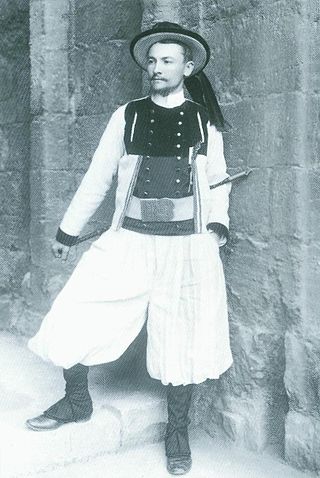
François-Joseph-Claude Jaffrennou was a Breton language writer and editor. He was a Breton nationalist and a neo-druid bard. He is also known as François Taldir-Jaffrennou, since he also used the bardic name Taldir. He was one of the pioneers of the Breton autonomist movement.

The Revolt of the papier timbré was an anti-fiscal revolt in the west of Ancien Régime France, during the reign of Louis XIV from April to September 1675. It was fiercest in Lower Brittany, where it took on an anti-lordly tone and became known as the revolt of the Bonnets rouges or revolt of the Torrebens. It was unleashed by an increase in taxes, including the papier timbré, needed to authenticate official documents.












